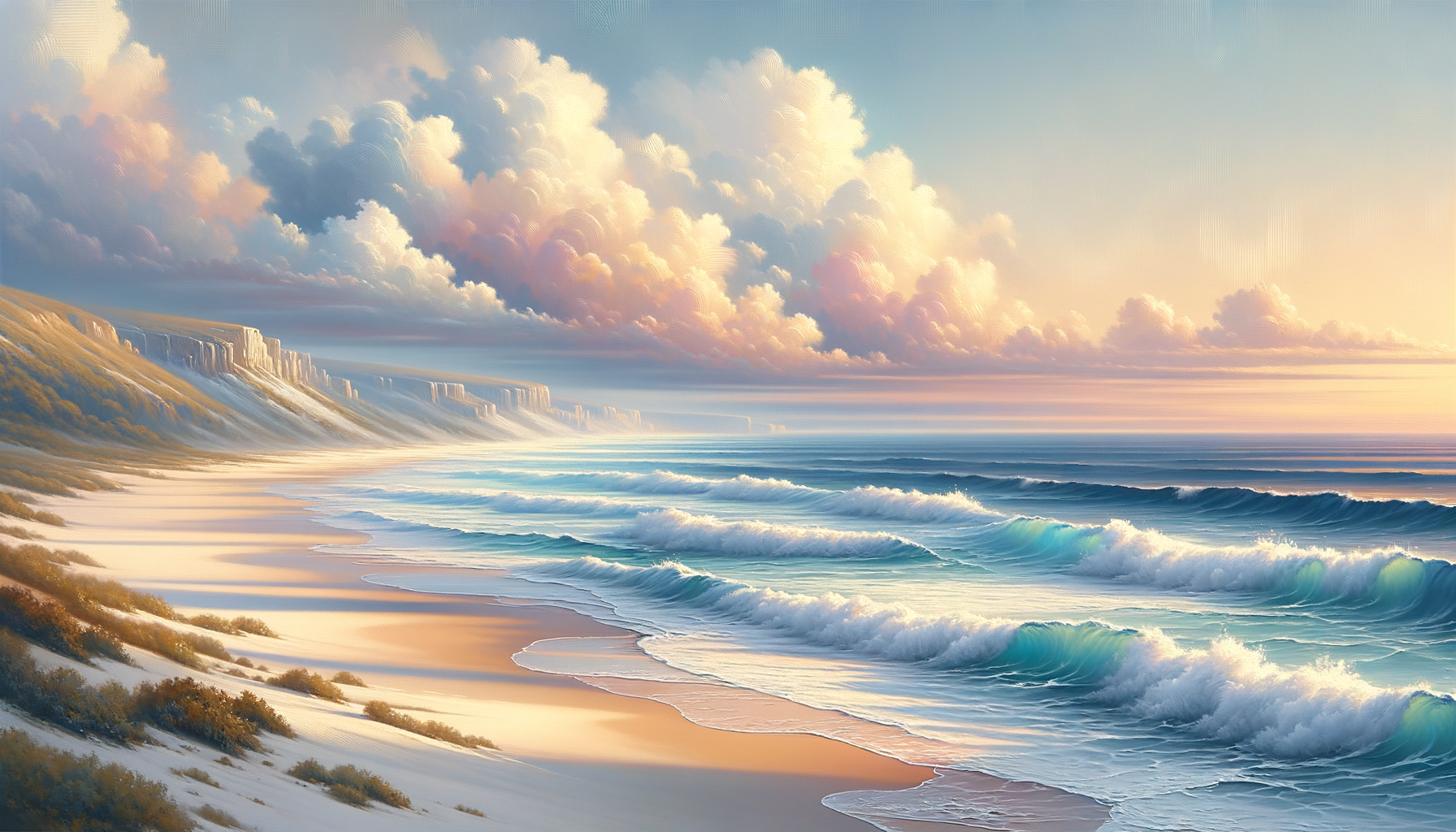There’s this thing about the place you grow up. It’s like that person you dated in your early twenties—the one who meant a little too much, a little too fast. You can’t decide if you miss them or if you’re just relieved the relationship didn’t end with you moonlighting as an extra on an episode of Dateline. My hometown, Myrtle Beach, feels kind of like that ex. Nostalgic and messy, charming and chaotic. It’s a love/hate relationship that, much like dating in your thirties, involves a hefty dose of self-reflection and a sprinkle of humor just to get through it.
Growing up here meant living on a postcard. The beach was our playground, and the salt air was always clinging to our skin and our family minivan. If you could ignore the neon lights and mini-golf courses screaming at tourists, the Grand Strand had a kind of romance, the kind that shows up in Pat Conroy novels or the lilting melodies of acoustic guitars played at sunset. But like any relationship, the cracks start to show over time. And trust me, Myrtle Beach has cracks—and sometimes those cracks are lined with neon fanny packs and overpriced funnel cake.
Boardwalk Romance and the Bumper Cars of Adulthood
If Myrtle Beach were a person, it would be that partner who insists they’re "laid back," but you quickly discover their idea of a good time is cannonballing into chaos. Summers here were like a perpetual rom-com montage: weekend bonfires, Ferris wheel rides, and the buzz of boardwalk arcade games. There’s a kind of easy enthusiasm in beach-town relationships. It’s like starting a new fling on vacation—you’re not thinking about whether they’re going to ghost you when Labor Day rolls around; you’re thinking about how much fun you’re having in the moment. Living here felt fun, light-hearted, and full of potential.
But adulthood has a way of hitting like a bumper car. Sure, the thrills are still there, but now you’ve got overdue bills, gas prices that make you audibly groan, and, oh yeah, the realization that living in a tourist town means every spring you’re outnumbered by sunburnt strangers demanding directions to Ripley’s Believe It or Not. I couldn’t wait to leave for college—in Charleston, no less, where the cobblestone streets whispered sophistication and escape. Myrtle Beach suddenly became the ex who was always a little too loud at dinner parties, the one who wouldn’t stop talking about that one time he rode the Slingshot at Broadway at the Beach.
The Things That Stay With You
Here’s the thing, though: no matter how far you go, pieces of where you grow up stick to you like sand in a beach bag. College showed me how much I missed the small things about Myrtle Beach—the lazy rhythm of waves cresting at dawn, the way weekdays would stretch like taffy in the off-season. I even missed the chaos in a weird way, kind of like laughing over a ridiculous ex’s quirks after you’ve healed from the breakup.
More than anything, though, it’s the people. My grandparents met at a Myrtle Beach dance hall in the 1950s, and that kind of small-town love story is woven into the fabric of the Grand Strand. My first crush was the lifeguard who manned Tower 7 near our café. My first heartbreak was watching a high school boyfriend leave for the Army, his car packed with surfboards and a box of powdered donuts for the road. These aren’t just memories—they’re the threads that hold the imperfections of Myrtle Beach together with a kind of wistful charm.
So when I hear people complain about their hometowns, I get it. Sometimes, it feels easier to ditch the whole narrative and shrink it down to just the flaws. But where we’re from doesn’t let us off the hook that easily. You don’t escape the influence of a place—it clings to your sense of humor, your idea of romance, your absolute misstep in thinking you could pull off wearing Sperry Topsiders in public.
Lessons My Hometown—and My Heart—Taught Me
Living in a whirlwind place like Myrtle Beach gave me some pearls of wisdom—and let’s be real, some of those pearls were probably bartered during a BOGO deal at a tourist shop. Still, they’re worth holding onto. Here’s what the Grand Strand (and maybe dating, too) taught me:
-
Love is messy but worth it. Tourists didn’t come to Myrtle Beach for its well-paved intersections or lack of tacky souvenir shops. They came for the sun, the sand, and the spirit of a place not afraid to be itself. Turns out, relationships are a lot like that. People don’t flock to perfect—they gravitate toward real.
-
Sometimes, you’re the beach. Sometimes, you’re the boardwalk. Myrtle Beach taught me that I can be tranquil and calming one day, chaotic and neon-lit the next. You don’t always have to pick a lane or know exactly how to feel—you just need to keep showing up, keeping the tides moving.
-
Learning to leave… and come back. Moving away taught me to appreciate the things I’d taken for granted: the familiarity of the shoreline, the charm of a family café. Dating’s no different—you have to walk away from someone (or something) to understand what’s worth revisiting.
-
It’s okay to be unapologetically a little… extra. Myrtle Beach wouldn’t be Myrtle Beach without giant gorillas perched on putt-putt courses or its unapologetic love for fried dough. And maybe I wouldn’t be me without a little bit of grit and a lot of romanticism baked into my personality.
Home Is What You Carry With You
These days, I’ve made peace with my love/hate feelings about Myrtle Beach. It hasn’t stopped being over-the-top, but I’ve stopped fighting the part of myself that’s still got a soft spot for it. Living here shaped me in ways I’m finally old enough to appreciate.
It’s why the Atlantic still feels like a familiar embrace when I run along its shores. It’s why I find romance in the little things—a blue crab scuttling across the sand, a half-deflated beach ball tumbling across the dunes after sunset. These things remind me of home in the best ways: unpolished, sun-soaked, and determined to leave me smiling just when I think I’ve outgrown it.
So, for anyone wrestling with their own past or pining for the horizon line of somewhere new, let me say this: home doesn’t have to be the be-all, end-all of your story, but it’s always going to be the foundation. You can leave, you can grow, and you can even swear you’ve got nothing left to learn from it. And yet, like the tide, it’ll keep whispering its lessons back to you—until you, finally, can love it for what it was and what it gave you.




















